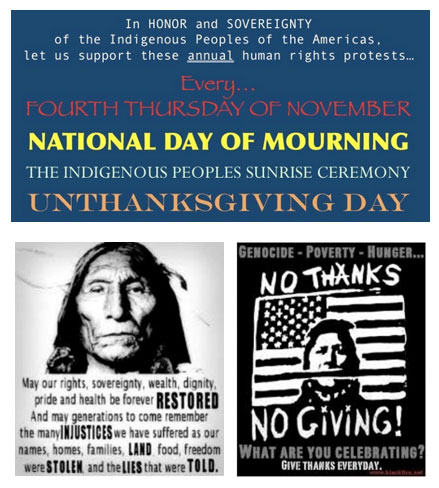What Does Thanksgiving Mean to Native Americans?
What Does Thanksgiving Mean to Native Americans? September 2023

The fourth Thursday in November will be upon us soon. Thanksgiving is a uniquely American festival that also happens to mark the start of the holiday season. Now that COVID is (hopefully!) behind us and the world has returned to normal, it is a time for most Americans to properly celebrate the good things in life with their loved ones. The qualifier “most” is used for a reason – for the original inhabitants of this land, the fourth Thursday in November is a day of introspection, for remembering what they have lost and even a day of mourning. As the United American Indians of New England say - “Thanksgiving day is a reminder of the genocide of millions of Native people, the theft of Native lands, and the relentless assault on Native culture.”
The Truth Is Now Known -Un-Thanksgiving
https://www.sfexaminer.com/archives/san-francisco-s-indigenous-unthanksgiving-returns-full-force-to-alcatraz-island/article_31d617b8-c555-58cf-9aed-5a20e6960784.htmlThe sanitized history that was taught in the past is slowly being erased from public memory and the truth about the genocide of countless Native Americans, the attempted destruction of their culture and the theft of their lands and resources is now well-known. That is not to say that Native Americans are against the celebration of the day and want the festivities stopped, however, there are many Native tribes and people who want public events surrounding Un-Thanksgiving events around the country . What they ask for is a reevaluation of the basis of the celebration in conjunction with the historical facts of what preceded the first Thanksgiving along with the truth of what happened for centuries afterwards. For the indigenous people of America, Thanksgiving means many things.
What Is Thanksgiving?
Thanksgiving means different things to Native Americans. Among the most common perspectives are:
- Reflection on History: For many Native Americans, Thanksgiving is a time to reflect on their history and the impact of European colonization. It serves as a reminder of the loss of land, culture, and lives that occurred as a result of colonization, including the forced removal of tribes from their ancestral lands and the devastating effects of diseases, violence, and displacement.
- Cultural Celebration: Some Native Americans use Thanksgiving as an opportunity to celebrate and honor their own cultural traditions and heritage. This may involve sharing traditional foods, stories, dances, and rituals with family and community members.
- Gathering and Reconnection: Thanksgiving can be a time for Native families and communities to come together, reconnect, and strengthen bonds. It offers a chance to spend time with loved ones, share experiences, and reaffirm cultural identity.
- Cultural Preservation: Thanksgiving can also serve as a platform for cultural preservation efforts. Some Native communities use the holiday as an opportunity to teach younger generations about their heritage and traditions, ensuring that these cultural practices are passed down to future generations.
- Activism and Awareness: Some Native Americans use Thanksgiving as a platform to raise awareness about indigenous issues, including land rights, sovereignty, and social justice. It's an opportunity to educate others about the challenges that indigenous communities continue to face.
- Mixed Feelings: It's important to acknowledge that not all Native Americans have positive feelings about Thanksgiving. For many, the holiday represents a painful history of colonization, exploitation, and oppression. Some may choose to ignore or actively protest against the holiday because of these associations.
Thanksgiving is now a part of the American ethos and will remain so. The value and meaning of this festival can be strengthened and expanded if a greater and more concerted effort is made to understand what happened to Native Americans after 1620. The efforts of the Muwekma Ohlone Tribe of the San Francisco Bay Area is a case in point. Muwekma Ohlone tribal events and celebrations and the Ohlone language and revitalization efforts are adding to the understanding of Native American life and culture and how they impact life today.